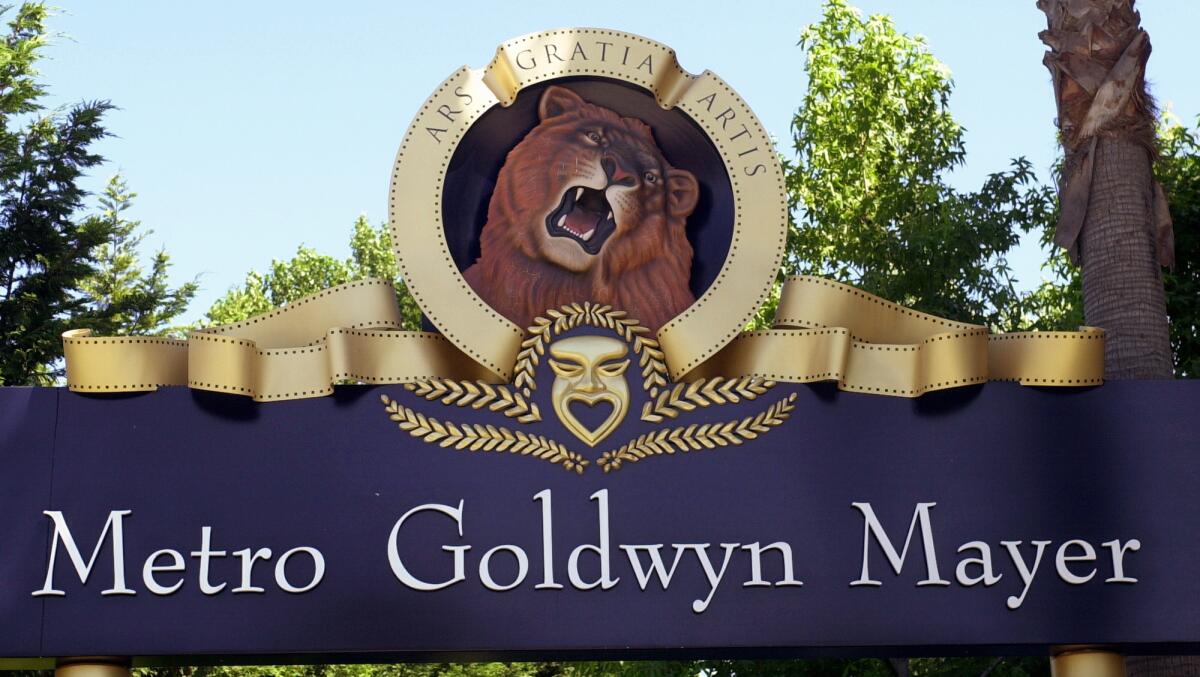After the Disney-Fox deal, smaller players like Paramount and MGM face pressure to bulk up

Walt Disney Co.’s blockbuster deal to buy much of 21st Century Fox revealed Rupert Murdoch’s fear that his media company was not strong enough to survive the digital onslaught — raising questions about how even smaller media companies will weather the storm.
Since Disney clinched its $52.4-billion deal last week to buy some of Murdoch’s most lucrative assets, many wonder which media companies might be next.
The scramble to bulk up is likely to force medium-sized players to strike their own deals out of concern that they need to grow or get left behind as tech giants like Netflix gain more power in Hollywood.
Sony Pictures Entertainment, CBS Corp., Viacom Inc., Liberty Media Corp., Lionsgate and Metro-Goldwyn-Mayer suddenly look like bantamweights among the big behemoths.
“There’s going to be considerable pressure for the smaller companies to sell,” predicted Ken Kleinberg, a veteran Los Angeles entertainment business lawyer. “If companies like Fox are worried, what are they waiting for?”
The Disney-Fox deal is just the latest combination. Earlier this year, Discovery Communications announced a marriage with Scripps Networks Interactive, which owns HGTV and Food Network. Expect more deal-making to come.
“This is clearly an arms race and these companies need to step up their game,” said Lloyd Greif, a Los Angeles investment banker. “We are going to see more creative acquisitions — and acquisitions of intellectual property.”
Here’s a look at some possible merger scenarios:
Viacom
The most obvious corporate pairing, many analysts say, would be CBS and Viacom Inc. because both are controlled by the Sumner Redstone family. Shari Redstone, the ailing mogul’s daughter, now is the chief decision maker. Last year, she favored a plan to rejoin the two companies (they were separated in 2006), but she abandoned the effort when CBS balked at the price that Viacom’s board was seeking for Viacom’s shares.
Since then, Viacom has continued to confront declining ratings at MTV and Comedy Central and struggled to maintain premiums on the fees it charges pay-TV providers for the rights to carry its channels, including Nickelodeon.
“What does Shari do? She looks like a small fry and the family has badly lagged the market in wealth creation over the decade,” said media analyst Michael Nathanson. Viacom’s shares have fallen more than 60% in the last five years, and currently hover around $31 a share.
By contrast, CBS is stronger because its flagship network is viewed as must-have programming. It also has been more aggressive about expanding its CBS All Access streaming service with original content, including “Star Trek: Discovery.”
There also has been speculation that mobile phone giant Verizon Communications might be interested in buying CBS.
CBS also could be a buyer. In the past, Chief Executive Leslie Moonves had his eye on Sony Pictures — but that studio’s Japanese parent company made it clear that it wasn’t interested. Now, CBS may consider buying AMC Networks, home of “The Walking Dead” and “Better Call Saul” or uniting with Lionsgate or MGM.
Verizon, CBS and Viacom declined to comment.
Lionsgate
Known for franchises such as “The Hunger Games” and TV shows including “Orange Is the New Black,” Lionsgate has long been viewed as ripe for the picking.
“I think Lionsgate is the next attractive target,” Greif said.
Sony could use Lionsgate to bolster its film and TV business. Alternatively, a telecom provider such as Verizon could use it to jump-start its content business and create original video to entice mobile service customers.
Recently, the Santa Monica studio has been a buyer, rather than a seller. The studio acquired cable network Starz last year for $4.4 billion to build the latest media powerhouse.
MGM
MGM, which has been growing under the leadership of Gary Barber since its 2010 bankruptcy reorganization, is also the subject of much deal-making conjecture.
The Beverly Hills studio is returning to the business of distributing its own films domestically through a joint venture with Megan Ellison’s Annapurna Pictures.
MGM’s resurgent business has also benefited from a fast-growing TV arm, which produced the Emmy Award-winning streaming hit “The Handmaid’s Tale” for Hulu.
Some analysts and bankers believe that MGM and Lionsgate might be acquired by John Malone’s Liberty Media. Another scenario: CBS could scoop up both studios along with Viacom’s Paramount Pictures.
Still, neither Lionsgate nor MGM appears eager to sell, at least for now, bankers said.
“I don’t think anyone’s ready to go home yet,” said one banking source who was not authorized to speak publicly and asked to remain anonymous.
Representatives for MGM and Lionsgate declined to comment.
Sony
As Disney gains clout, expect Sony Pictures Entertainment to make a move of its own. Sony’s film studio is trying to rebound but still ranks fifth among the major studios in domestic market share.
The Culver City studio made management changes in the last year, bringing in former Fox executive Tony Vinciquerra as its new chairman and chief executive in June to replace outgoing Michael Lynton. Last summer, it revamped its television team when two top programmers defected to Apple.
“The entertainment industry is in a time of consolidation,” Vinciquerra wrote in a note to his staff last week. “In this climate, studios will either grow or become a target for acquisition. … It is my goal to do the former, not the latter.”
Potential acquisition targets could be MGM, Lionsgate or a company with cable television channels. Sony could also strike a partnership to provide programming to the Fox broadcast network.
Comcast
The Philadelphia pay-TV and Internet service giant is one of few companies with the balance sheet needed to pull off a big-ticket transaction, but its ambitions have been thwarted.
Comcast triggered the current wave of consolidation when it bought media company NBCUniversal in 2011. Last year, Comcast acquired DreamWorks Animation studios to bolster Universal’s presence in animation. Comcast Chairman and Chief Executive Brian Roberts even tried to engage Murdoch in merger talks — but the mogul didn’t bite.
What Comcast lacks is a national footprint. Its subscriber base includes only about a third of the country. Comcast three years ago attempted to buy Time Warner Cable to extend its reach to Los Angeles, New York and Dallas. But regulators frowned on the deal, which Comcast abandoned.
Meanwhile, Comcast also has been growing its high-speed internet service and pushing into mobile phone service through a partnership agreement with Verizon. Comcast could buy Viacom’s international television networks in Britain and India, or move more heavily into phone service.
New Fox
If regulators approve the sale to Disney, the Murdoch family will be left with a slim portfolio that includes Fox News Channel, Fox Business Channel, Fox Sports 1, Fox Sports 2 and the Fox broadcast network.
Some analysts believe the remaining company might not survive on its own, and could buy other TV station groups such as Tegna. Others are betting that Murdoch will eventually recombine the Fox assets with the publishing company his family controls — News Corp. That entity owns such newspapers as the Wall Street Journal, New York Post and Times of London.
Murdoch didn’t rule out such a merger last week in an interview with the Fox Business Network when he said: “Ideally, yes, but I think that’s years away.”
Time Warner
It’s been nearly 14 months since Dallas telecommunications giant AT&T unveiled its $85-billion bid for Time Warner Inc., which owns CNN, HBO, TNT, the Cartoon Network and the Warner Bros. film and TV studio in Burbank. Last month, the U.S. Justice Department sued to block the deal.
A federal judge has set a March 19 trial date for the government to present its case. The outcome will either chill the market for mergers or invite a further frenzy.
“The question is, do these deals get done,” asked one high-level media executive.
Apple et al.
Tech giants such as Apple, Facebook and Google have the financial clout to buy major media players, and all have made serious moves to create original programming that they can deliver directly to viewers through their own streaming platforms.
But for now, the companies seem more interested in building their own content operations to make TV shows and short-form programming and finding new ways to get consumers to spend more time on their devices.
“I don’t think these technology companies will acquire Hollywood production or studio capabilities,” said Susan Bidel, a senior analyst with Forrester Research. “They recognize that it would be outside their core competencies — and a huge distraction.”
More to Read
Inside the business of entertainment
The Wide Shot brings you news, analysis and insights on everything from streaming wars to production — and what it all means for the future.
You may occasionally receive promotional content from the Los Angeles Times.








